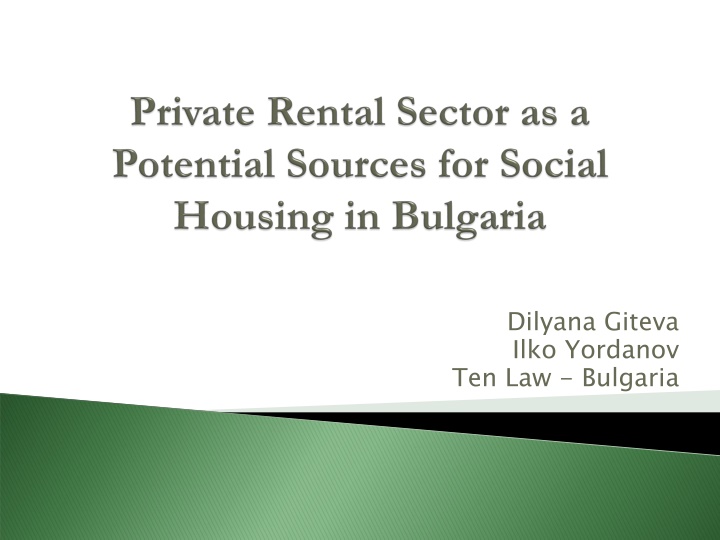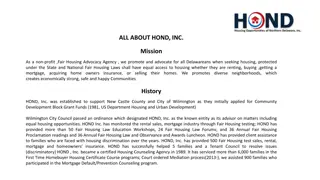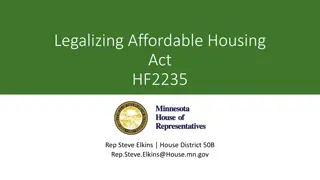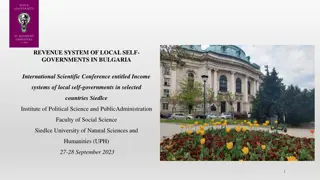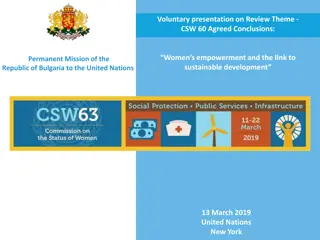Challenges and Opportunities in Bulgaria's Housing Sector
Bulgaria faces significant challenges in its housing sector, including population decline, high poverty levels, limited demand for rental housing, and lack of effective social housing policies. These issues are compounded by unbalanced regional development and inefficient legal frameworks. Despite obstacles, there is potential for exploring Social Rental Agency (SRA) models to address these challenges and improve tenancy relations in Bulgaria.
Download Presentation

Please find below an Image/Link to download the presentation.
The content on the website is provided AS IS for your information and personal use only. It may not be sold, licensed, or shared on other websites without obtaining consent from the author.If you encounter any issues during the download, it is possible that the publisher has removed the file from their server.
You are allowed to download the files provided on this website for personal or commercial use, subject to the condition that they are used lawfully. All files are the property of their respective owners.
The content on the website is provided AS IS for your information and personal use only. It may not be sold, licensed, or shared on other websites without obtaining consent from the author.
E N D
Presentation Transcript
Dilyana Giteva Ilko Yordanov Ten Law - Bulgaria
Social, economic and policy context Implications for tenancy relations Legal conditions Exploring potential advantages of SRA and possible ways of its adaption in Bulgaria There is no obstacles and barriers to introduce SRA model however no incentives and policy are in place to trigger its implementation in Bulgaria
Decrease of population growth and emigration - in the last 20 years when Bulgaria lost over 1.1 million of its citizens; Monetary poverty social transfers - highest share in EU-28 for 2011; Poverty II level are situated in Bulgaria; Law enforcement settling disputes is ranked 126 out of 142 countries (Global Competitiveness Index, 2012-2011 World Economic Forum); Lack of effective social housing policy faire"; ; Unbalanced regional development Decrease of population negative demographic Monetary poverty People at risk of poverty after Poverty 5 out of the six poorest EU regions at NUTS Law enforcement: Efficiency of legal framework in Lack of effective social housing policy "laissez- Unbalanced regional development
Regional gross domestic product (PPS per inhabitant in % of the EU27 average) by NUTS 2 regions Regional gross domestic product (PPS per inhabitant in % of the EU27 average) by NUTS 2 regions % % o o f f 80 70 60 50 40 30 E E U U 2 2 7 7 20 10 0 NUTS 2 regions NUTS 2 regions
Limited demand of rental housing Large number of abandoned houses - vacant housing stock - 1.22 million units in 2011 Concentration of the demand in very few big cities Narrowed opportunities for mobility Lack of solvent demand Decreasing rent prices Depopulation Unbalanced regional development Poverty Lack of e efficiency legal framework settling disputes Lack of effective social housing policy Depopulation Unbalanced regional development Poverty Lack of fficiency of legal framework in settling disputes Lack of effective social housing policy of Lack of confidence between the landlords and tenants in Poor maintenance and decreasing quality of social housing fund - mostly vulnerable groups in bigger cities affected Growing number of illegal housing stock every 4thhouse in poorest communities is illegally built Unregistered tenancy contracts Shrinking number of social houses
Between 1985 and 2011 the number of state- owned dwellings in Bulgaria was reduced more than 6 times from 441,493 to 69,878. This represents 2.6% of all inhabited dwellings. 785,000 tenants (11,1% of all residents) rent at reduced price or for free however the available social housing fund is only 69,878 dwellings. Informal social networks housing - filling the gap of state absenteeism in housing policy relatives, neighbors, friends
Inhabited dwellings by tenancy types (%), NSI, Census, 2011 Tenant, rent free 7.1% 6.2% Tenant, rent free Owner/Tenant, rent free and tenant Owner/Tenant, rent free and tenant Institutional dwellings Institutional dwellings Total Dwellings Residents Total Dwellings Residents Owner 81.7% 81.1% Owner Tenant 6.4% 6.2% Tenant 4.8% 6.1% 0.03% 0.4%
Tenants renting at market price are the tiniest tenancy group - currently 120,000 (or 1.7% of all residents) (Eurostat, 2012) citizens pay rent at market price; Major tenants groups: - - Students dwellings (due to the scarcity of public students dwellings - according to the last Census the overall number of students and workers dwellings is 15 659) highly dispersed university centres and big flow of students studying abroad that ease the pressure over the tenancy market; - - Young individuals and families qualification moved from their native cities to find better job opportunities in biggest cities and the capital (not meeting financial credit institutions criteria for mortgages or not willing to take the risks of bank loans). Students studying in cities where their families do not own Young individuals and families with medium and high
The demand of social housing is much higher than the demand for private rental State and municipalities are not able to meet the needs of social housing A working model of matching the demand of social housing and supply of private rental housing is needed For the poorest strata the alternative solution is already in place informal social networks housing It seems that in short term the SRA model could be beneficial mostly for middle situation of most vulnerable groups. Specific niches for SRA development in Bulgaria - Piloting social rental agency services for university students the higher education reform (university concentration) takes place) - Targeting at poor landlords and old persons - mainly pensioners) who need rent income to cover their housing and living expenses. - Encouraging SRA as a component of cohesion policy financed with EU funds in the new EU Program Period (2014-2020) - beneficial mostly for middle- -class tenants class tenants and with only indirect impact over the housing Specific niches for SRA development in Bulgaria university students (especially if poor landlords in biggest cities and university centres (single SRA as a component of cohesion policy triggering a project
The state is obliged to provide social protection, including housing No explicit right to housing in the Constitution, but Bulgaria is social state Wide margin of appreciation of the state what measure to undertake to encourage acquisition of property for housing purposes, to provide housing free of charge or on low, affordable rates, to maintain own housing or to use private housing for social purposes, tax policies, etc.
Aim of the interference - legitimate Proportionality of the interference - fair balance between the general interests of the community and the right of property of landlords (upholding the principle of freedom of contract) Appropriate measures Alternative solutions Compensation
System of rent control: - Capping of rent prices. - Freezing of rent (with or without possibility for the landlord to levy extra charges in respect of costs of administration, taxes, and special equipment) - On conclusion of a new lease the landlord could not ask for an increase exceeding a maximum amount laid down in the law - The landlord to be obliged to use some part of rent income for maintenance purposes
Providing for a number of restrictions on the landlords right to terminate a lease: - Leases could be terminated only for important reasons - The lease not to be terminated when the tenant dies or right of succession of near relatives (spouse, children and adoptive children, brothers and sisters) and other persons who had lived in the household of the tenant - When the landlord or near relatives wish to use the apartment in question the contract could only be terminated if there exists an "urgent need", and if adequate alternative accommodation available to the tenant was made
Legislation constructed and owned by non-profit-making housing associations Special tenancy tribunals or tenancy divisions within court system Tax reduction for providing housing to certain categories (young families with children, elder people and people with disabilities of other vulnerable groups) and practice on buildings
If regulated amount is regarded as insufficient by many landlords, they will prefer to leave vacant apartments in respective category unoccupied, and this will put an additional strain on the housing market and tend to lead to higher rents for the remaining categories of apartments/houses Concluding agreements on different, higher prices black market Evading the law minimum rent price but additional payments for running costs (utility bills), repairing, maintenance, taxes and fees, insurance and others to be imposed on the tenant No investment in new buildings as no possibilities to return the costs of the investment less houses for rent higher prices of the existing If some categories are over protected (families with children) risk to be avoided as tenants
Freedom of contracts Mandatory rules: - maximum term of the agreement 3 or 10 years; - no written form required for the validity of the agreement - legal technique used by the legislator is: if not otherwise agree dispositive norm; if the term is longer, then the contract will be considered to be signed for the maximum term above overcoming of clauses contradicting to mandatory rules - tenant of a dwelling in a condominium must obey the internal rules of the condominium. Otherwise he may be evicted from the leased premises upon the motion of the management mandatory rule, which could not be excluded by the agreement between the tenant and landlord
exact lease term (within the limits pointed above) lease rate, periods in which the price will be paid daily, weekly, monthly or in longer periods, and respectively in the beginning of the lease period pre-paid or at the end, lease rate indexation ways of payment person (legal entity) to who has to be paid what is included in the price economy of size - utility costs, taxes, fees, insurance, different facilities, service charge sub-contractor and/or managing company, additional expenses, liability for damages, loss, inconvenience or disturbance, subletting, insurance, termination of the agreement prior to the expiry of its term (unilaterally, with prior written notice, term of the notice, penalties, compensations, in cases of breach of the agreement with or without prior written notice specifying the breach and giving time the party to remedy the breach), pointing specific cases of breach of the agreement delay in payment, not using the premises in accordance with the purpose for which is rented, causing damages to the property, etc., paying of deposit and clarifying the purposes, for which it could be used.
lack of written agreement the real estate property does not comply with the agreed conditions (hidden defects, excessive levels of noise from various sources, smaller than the negotiated area, etc.) breaches of the contract by the landlord (unlawful expelling) failure to perform maintenance works by the landlord selling the property or any other way of transfer of title exchange, donation, disturbance of the peaceful use of the house destruction of the property earthquake, fire, flood, collapse, demolition agreement is not signed with the owner (owners) or his duly authorized representative
non payment of rent price or utility bills damaging the dwelling and/or furniture and equipment need the dwelling to be repaired who will undertake it and who will pay refusal by the tenant to leave the dwelling following the termination of the agreement using professional assistance of lawyers, real estate agencies check of the property over the dwelling and representative power of attorney deposits and other guarantees, insurance mediation and alternative conflict resolution
Respect individual rights freedom of contracting and equality of parties Minimum degree of state interference Balance between individual and public interest Taking care of vulnerable groups Opting between different approaches for satisfying housing needs of the population: - renting v. acquiring of property (privatization state receive payment from the buyer, receiving taxes, fees, not responsible for maintenance of the dwelling and expenses for renovation, no risk for unpaid bills by the tenant) - public accommodation for social purposes v. social (private) rental agency Home v. shelter - state regulated prices v. free market
In depth researches to understand better opportunities and obstacles to introduce SRA model Comprehensive Ex ante assessment of the legislation Piloting a small-scale initiative
